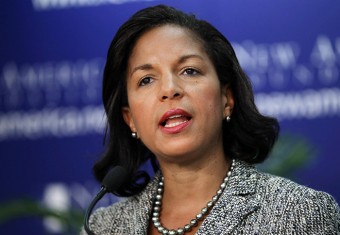
Susan Rice and American International Security
“The Chubb Fellowship was created to bring extraordinary presences to campus to inspire students,” Peter Salovey said as he introduced Susan Rice, National Security Advisor to the Obama Administration. Rice’s talk clearly fit the bill as she highlighted the analytical clear vision necessary to quiet the storms that have surged during her decades of US foreign policy service.
The event, this past Wednesday night in the Law School Auditorium, was moderated by Rice’s younger brother and Yale Corporation member John Rice. In questions ranging from the path forward for Syria to personal advice for dealing with setbacks, Rice revealed the drive that pushed her to be the second-youngest and only African-American female US ambassador to the UN in 2008, and, after almost twenty years in international security, the 24th National Security Advisor in 2013. Across all questions, Rice pushed against oversimplification, arguing for pragmatic approaches to problems too complex for ideology alone to meet.
What stood out in the talk, however, was Rice’s perspective on Syria. Rice’s discussion of Syria provided an insight into how the White House international security brain trust, headed by Rice, saw the state of the world. Rice lay out three tenets of the US position in the conflict. Firstly, the only resolution in Syria is through a political solution. Secondly, the Assad regime must step down in favor of a transition government; and thirdly, the ISIL threat can only be met with direct confrontation. Syria is a political tangle where extremists and moderates comingle, and allies have conflicting ideologies. Rice emphasized how mutual assent among Syrians, the US, and other players such as Russia cannot be achieved without the removal of Assad, and a resulting transitional government, with “less blood on their hands”. However, she also believed that the stage of the transition in which Assad would depart is open for compromise, and that it was far more important that the transition is operationalized as soon as possible. The focus on concrete plans amid political uncertainty was a priority for Rice throughout the speech, and in the case of Syria, ideological compromise for the sake of action towards the goal of directly confronting ISIL without competing scenarios was ideal to the Obama foreign policy team. ice’s view of the role of American response to international crises did not revolve around institutional rhetoric, but around a series of logical decisions with carefully considered consequences”.
While Rice was mostly questioned on her policy views, her response was emblematic of the message related throughout the talk on the difficult multi-faceted nature of real world politics, and the imperfect choices that must be made for progress. When asked what guiding principles she followed above all else, Rice compared national decisions to a chess game of actions and reactions on a grand scale. The necessity of strong US leadership can only be actualized in a world of policies understanding social, economic, and many other factors of realities.
Rice’s focus on real solutions with clear goals resonated with the audience. “It struck me how politics can get in the way of genuine international cooperation,” Jonathan Coutinho, TD ’18 said. Samantha Stroman, TD’18 complemented his view: “she was refreshing because we could see how foreign policy is actually decided. People have lofty ideas, but the basis of our foreign policy is protecting first US security.” Inspirational, pragmatic, and accomplished, the Chubb fellow gave insight into foreign policy with a practicality rarely seen in an idealistic college campus, providing a new perspective to students and non-students alike in attendance.
Katie Ward is a sophomore in Timothy Dwight college. Contact her at kathryn.ward@yale.edu